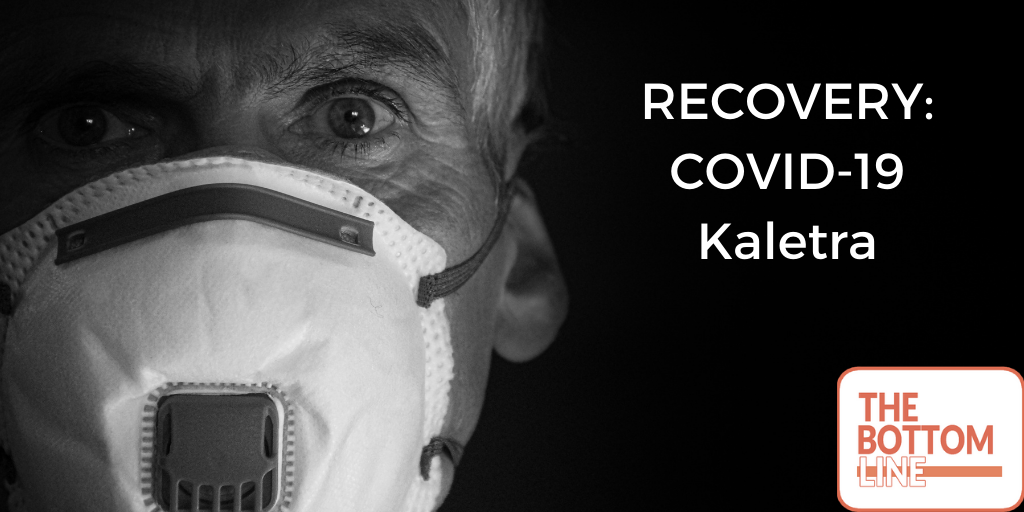RECOVERY: COVID-19 Kaletra

Lopinavir-ritonavir in patients admitted to hospital with COVID-19 (RECOVERY): a randomised, controlled, open-label platform trial
Recovery Collaborative Group. @PeterHorby @MartinLandray,The Lancet October 5 2020: doi.org/10.1016/S0140-6736(20)32013-4
Clinical Question
- In patients admitted to hospital with COVID-19, does Lopinavir-ritonavir therapy (Kaletra) compared to usual care, reduce 28-day mortality?
Background
- In December 2019 the Wuhan province in China became the epicentre of a devastating, highly contagious viral infection, SARS-CoV-2, a novel coronavirus that causes COVID-19 illness
- By March 2020, the World Health Organisation announced they were deeply concerned by the alarming levels of spread and severity of the disease and characterised COVID-19 as a pandemic
- To date there are more than 40 million confirmed cases worldwide and 1 100 000 deaths
- There have been many trials conducted on patients with COVID-19, with the hope to find effective therapeutic options. To date, the treatments that have shown effectiveness are Dexamethasone, which reduces 28-day mortality and Remdesivir, which may reduce hospital length of stay.
- The RECOVERY (Randomised Evaluation of COVid-19 thERapY) trial describes an overarching trial design that looks at different treatment options simultaneously in patients with SARS-CoV-2 infection, in an adaptive design. The treatments being studied are:
- No additional treatment (usual care)
- Lopinavir 400mg-Ritonavir 100mg by mouth (or nasogastric tube) every 12 hours for 10 days
- Azithromycin 500mg by mouth (or nasogastric tube) or intravenously once daily for 10 days
- Tocilizumab (an anti-inflammatory treatment given by injection)
- Convalescent plasma (collected from donors who have recovered from COVID-19 and contains antibodies against the SARS-CoV-2 virus)
- REGN-COV2 (a combination of monoclonal antibodies directed against coronavirus).
- Hydroxychloroquine (this arm of the trial has ceased recruitment, as no benefit demonstrated)
- Dexamethasone, oral (liquid or tablets) or intravenous preparation 6 mg once daily for 10 days. Trial completed in adults but recruiting children
- This review looks at the Lopinavir-ritonavir (Kaletra) arm of the RECOVERY trial
- Lopinavir, a protease inhibitor, has been demonstrated in-vitro to reduce SARS-CoV-2 replication and release from host cells. It is combined with ritonavir to increase its plasma half-life. There is one previous trial published in hospitalised COVID-19 patients, where 99 patients were randomised to Kaletra and 100 patients to usual care: The LOTUS trial. There was no difference in viral clearance, time to clinical improvement or 28-day mortality between groups
Design
- Randomised open-label platform trial
- Randomisation occurred in a ratio of 2:1 [usual care:Lopinavir-ritonavir]
- Allocation concealment
- No blinding of participants or caring staff
- Blinding of outcome assessors, investigators and the trial steering committee.
- A single online follow-up form was completed when participants were discharged alive from hospital, died or at Day 28 after randomisation
- Intention to treat analysis
- Pre-specified subgroups (six in total: age, sex, ethnicity, level of respiratory support, days since symptom onset and predicted 28-day mortality risk)
- Sample size calculation is difficult in the situation of a pandemic. The plan was to enrol several thousand patients. An independent data monitoring committee reviewed unblinded data at intervals of around 2 weeks and were responsible for stopping the trial once the results were convincing one way or the other
Setting
- 176 hospitals in the UK
- Patients were randomised between March 19 2020 and June 29 2020.
Population
- Inclusion: patients admitted to hospital with suspected or proven SARS-CoV-2 infection
- Exclusion:
- Hepatic insufficiency
- Currently medicated with a drug that depends on cytochrome P450 3A4 for metabolism
- Lopinivir-ritonavir was unavailable at the institution
- The attending clinician felt Lopinavir-ritonavir was absolutely indicated or contraindicated
- The baseline characteristics were well matched between groups
- The mean age was 66 years, the median number of days since symptom onset was 8; 26% were not receiving oxygen, 70% were receiving oxygen and only 4% were invasively ventilated
Intervention
- Lopinavir + Ritonavir
- Patients randomised to the active group received lopinavir 400mg + ritonavir 100mg per oral every 12 hours for 10 days AND usual standard care
- 1616 received the intervention
Control
- Usual standard care
- 3424 were allocated usual care
Management common to both groups
- Azithromycin was given to 23% in the intervention arm and 25% in the usual care arm
- Dexamethasone was given to 10% in each arm
- Tocilizumab was given to 3% in the intervention arm and 4% in the usual care arm
Outcome
- Primary outcome: 28-day mortality: no significant difference
- 23% in the lopinavir-ritonivir group and 22% in the usual care group
- RR 1.03 (95% C.I. 0.91-1.17), p=0.60
- 23% in the lopinavir-ritonivir group and 22% in the usual care group
- Secondary outcomes:No significant difference in any secondary outcome
- Comparing lopinavir-ritonivir groups
- Time to hospital discharge: median 11 days vs. 11 days
- Discharged from hospital within 28 days: 69% vs. 70%
- Progressed to receipt of mechanical ventilation: 10% vs. 9%
- Death: 22% vs. 22%
- No difference in cardiac arrhythmias or other adverse effects
- No difference in the pre-specified subgroups
- Comparing lopinavir-ritonivir groups
Authors’ Conclusions
- Lopinavir-ritonivir therapy is not an effective treatment for patients admitted to hospital with COVID-19
Strengths
- Large sample size, allocation concealment, intention-to-treat analysis, near complete follow-up
- The outcome assessors were blinded to the allocation
- The outcome was clinically meaningful and objective
- The funders of the study had no role in study design, data collection, data analysis or data interpretation
- The results are consistent with other trials of lopinavir-ritonivir in COVID-19 patients (SOLIDARITY trial and LOTUS trial)
- There did not seem to be other major adverse events observed, eg cardiac arrhythmias or liver function perturbance.
Weaknesses
- I’m unsure of the applicability of these results to ICU patients as only 4% of the patients included were invasively mechanically ventilated. The ongoing REMAP-CAP trial has lopinavir-ritonivir as one of the domains which will hopefully answer the question in critically ill patients
- However, this treatment is difficult to test in the ICU population if the patient is not swallowing tablets. The crushed tablet tends to block NGTs and the liquid formulation contains an alcohol which disrupts the material integrity of the NGT
- The treating clinicians were not blinded to the allocation which could introduce bias
- It is possible that this therapy needs to be given very early in the course of the disease as the mechanism of action is prevention of viral replication. However, even in those patients who were given the drug <7 days following symptom onset there was no signal of benefit
The Bottom Line
- Lopinavir-ritonivir does not improve outcomes in a hospital population with COVID-19 patients
- Further trials in critically ill COVID-19 patients may be warranted although there really is no signal of benefit and the drug is difficult to administer in patients unable to swallow, so I would be circumspect about this
External Links
- [article] RECOVERY: Lopinavir-ritonivir
- [further reading] The RECOVERY trial
Metadata
Summary author: @celiabradford
Summary date: Oct 20 2020
Peer-review editor: @davidslessor



